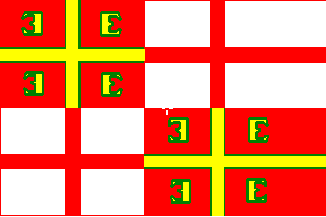
by Giuseppe Bottasini, 24 June 1996

Last modified: 2013-07-30 by rob raeside
Keywords: italy | padania | lega nord | romagna | sud tyrol | tuscany | trentino | veneto | venezia giulia | umbria |
Links: FOTW homepage |
search |
disclaimer and copyright |
write us |
mirrors
See also:

by Giuseppe Bottasini, 24 June 1996
In two quarters there is the red cross on white field, while
in the other two quarters there is a yellow cross (green
fimbriated) on a red field and 4 yellow green-fimbriated
"C" (something like the Serbian flag).
Giuseppe Bottasini, 19 September 1996
A flag for Romagna is proposed: in two quarters there is the
red cross on white field, while in the other two quarters there
is a yellow cross (green fimbriated) on a red field and 4 yellow
green-fimbriated "C" (something like the Serbian flag).
It has clearly Byzantine roots.
Mario Fabretto, 20 September 1996
Romagna: quartered 1-4 red cross on white; 2-3 yellow cross on
red and in each red quarter a letter like the ones in the serbian
arms.
Jaume Ollé, 29 December 1998
"Romagna" is identical to the Byzantine
one. Romagna belonged to Byzantine Empire for a long time. This
may explain the adoption of Byzantine flag by the Romagna
autonomist movement. The logo of the autonomist movement of
Romagna includes the flag. See its site
Giuseppe Bottasini, 29 August 2000
The proposed flag by Lega Nord and other Autonomist Movements
is directly derives from the old Byzantine Empire flag that was
created (according to "Libro del conoscimento de todos los
reynos", XIV sec.) by the combination of San Giorgio cross
and Paleologo dinasty's flag. The four symbols on Paleologo flag
could be "B" letters in greek alphabet, that could
stand for the motto: "Re dei re regnante sui re". The
Byzantine Domine was the only power that gave unity to Romagna
land (Esarcato e Pentapoli).
Paleologo's CoA is also present in 'Casale Monferrato' (Piemont)
CoA, in 'Ducato di Mantova' CoA, and in 'Paleologo of Monferrato'
family's CoA.
M.C., 29 August 2000
This emblem was drawn on bysantine coins in VI century and on
banner (labarum) of emperor Constantin. This is the flag of the
Byzantine Empire under the Paleologues' dinasty and it's a copy
of the one in Neubecker's "Heraldry - sources, symbols and
meaning (1976), p. 106. (incl the rounded corners)
Victor Lomantsov, 1 October 2000 ,Santiago Dotor
and Jarig Bakker, 3 October 2000
Indeed it is the Byzantine flag. Most probably it was chosen
by the "autonomists" there (a very very small minority)
because Romagna was Byzantine for a lot of time before being
"inherited" by the State of the church. Outside this
recent choice it has not any tradition of use in Romagna. The
most famous Italian coat of arms bearing the flag or arms of
Byzantium was NOT used in Romagna but was used in the Marchesato
del Monferrato (a sub region of Piedmont, between Turin and
Genoa), and also in Mantua. Both Monferrato and Mantua were
ruled at a stage by the Gonzaga Family which had some Paleologue
Byzantine ancestor, so for Monferrato and Mantua the Paleologue
Cross with 4 B is definitely there because of of some
family heraldic reason. What I remember without consultin
some book is that some Byzantine noblemen of the Paleologue
imperial dynasty settled in Italy I guess because of political
dissent with a new emperor in Constantinople (and more Byzantines
people and nobles took refuge in Italy at the time of the fall of
Byzantium to the invading turkish army in 1453). The south
slavians tribes of invaders which arrived in Illyria in the VII
century of our era, when began to reach the stage of forming
their kingdom adopted the trappings and symbols of the far
more complex ancient civilization of Byzantium and so from
Constantinople they usurped the eagle (which they re painted
white instead of gold) as a symbol of sovereignity and the red S.
George cross,too and the golden cross with the four golden B in
the four quarters. The "B" comes from basileus =
Greek for king and/or emperor and there were 4 because of a
Greek phrase saying something like king of the king reigning over
kings. The four Byzantine B in the serbian flags became four C.
Marcus Prometheus, 1 October 2000
Other Reported Flags
Has anyone ever seen this
flag I have found in an Italian site about dialects?
It is supposed to be a flag of Romagna, even if the site no
longer shows it.
Paolo Montanelli, 24 June 2003
In Flag Report 24, regarding to Romagna, a flag was published
that has a resemblance with the one posted by Paolo
Montanelli. The roster bear a scepter like the one pictured
in the flag. This flag, I believe, is used by the Leghiste
(followers of the Padanian Leagues). The text say: Flag adopted
(for use) toward September 2000. Yellow and red are the
national colors of Romagna. the cross fimbreated white symbolizes
to the romagnolos as one of the peoples of the Padania (whose
historical flag is red cross in white field); the rooster
represents to the ancestres, the Senon Gauls, and carries the
sceptre used by the ancient Celtic. Has four tones of blue
probably somewhat more strong that in the image (where the tones
correspond to those of the photo).
Jaume Ollé, 25 June 2003
see also: Emilia-Romagna Region and Byzantine Empire
SudTirolesi uses a white-red flag with the eagle.
Giuseppe Bottasini, 19 September 1996
Süd Tyrol - white over red with arms in center (white with
red eagle armed and tongued yellow and crowned with green
laurel).
Jaume Ollé, 29 December 1998
This flag (Horizontal white-red with shield bearing an eagle)
is listed under number 47 at the chart "Flags of Aspirant
Peoples" [eba94] as:
"South Tyrol [Süd Tirol] (Austrians of Alto Adige) - North
Italy".
Ivan Sache, 19 September 1999
Lega Nord Flag of Süd Tirol (Alto-Adige ), that is the actual
province of Bozen/Bolzano
M.C., 5 October 2000
I think that looks very much like the flag of the state of
Tirol in Austria.
Elias Granqvist, 5 October 2000
see also: Trentino-Alto Adige Region
Trentino - white over red, with arms in center: white with
black eagle over 4 mounts.
Jaume Ollé, 29 December 1998
Flag of Trentino (province of Trento), also called
Welschtirol, that is "celtic Tirol", because
differently from Südtirol this population speak a Gaul-romance
language.
M.C., 5 October 2000
see also: Trentino-Alto Adige Region
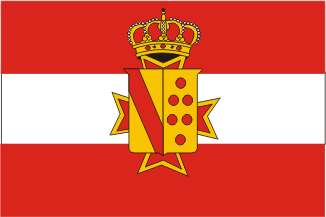
by Jaume Ollé, 19 February 2003
Toscani uses a horizontal red-white-red flags with a device in
the center but I do not know what it is.
Giuseppe Bottasini, 19 September 1996
Tuscany - Austrian flag with Tuscany arms (red cross bordered
golden, and upperimposed yellow shield: left of the observer with
five red balls; right, red diagonal band; above all golden
crown).
Jaume Ollé, 29 December 1998
"Lega Nord Toscana" has used two variants of a
different flag. The one above is the most recent one.
Paolo Montanelli, 19 February 2003
The shield is per pale, or a bend gules and or six roundels
gules. I would think the uppermost roundel on the sinister half
of the shield - larger than the other five - should be azure with
three tiny fleurs-de-lis or, which would make that half of the
shield the arms of the family of Medici.
Joe McMillan, 19 February 2003
see also: Tuscany Region
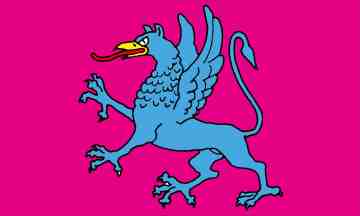
image resized from <www.leganord.org>,
located by Jan Mertens, 5 October 2008
Umbria - rose with blue griffin tongued red.
Jaume Ollé, 29 December 1998
A recent YouTube
film (Placed on YouTube by "LegaNordUmbria" on 5
Oct 2008.), shows the Umbria item first in a "television
studio", then in the street near two Lega Nord politicians.
Jan Mertens, 11 October 2008
see also: Umbria Region
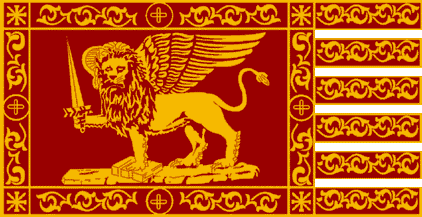
"War Flag"
by Jaume Ollé, 17 December 2000
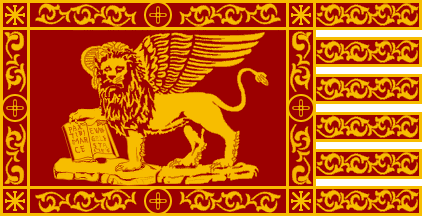
"Civil Flag"
by Jaume Ollé and Mello Luchtenberg, 2 January
2005
Veneti uses the flag of Venezia: red with the St. Mark golden
lion and many golden squiggles.
Giuseppe Bottasini, 19 September 1996
Veneto - the well know complex design with San Marco lion with
sword (no book)
Jaume Ollé, 29 December 1998
This flag on top is neither the actual flag of "Liga
Veneta" (= Northern League Venetian section), nor the flag
of the "Serenissimi" ("Serenisimi" in
Venetian language), indipendentist movement from Veneto, who
became famous in 1997 for having "conquered" for some
hours the famous Bell-Tower of St. Mark in Venice.
Northern League reused the flag with the sword as the "Flag
of Orobia" (= Eastern Lombardy, Provinces of Bergamo and
Brescia, which were once dominated by the "Serenisima")
where people speak a "dialect" quite different from
Western Lombardy (or "Insubria") and hardly
understandable for other people: in Italian, when we hear a
strange word or phrase, we may say "Che è,
bergamasco?" (= What is this? Bergamo idiom?). You can see a
small gif at <www.padaniacity.com>.
I daresay that's the top flag modified with blue background!)
Paolo Montanelli, 20 March 2003
The flag of Liga Veneta is similar to the upper flag but with
an open book and with no sword: look at <www.naz-veneto.leganord.org>
from the official website of Liga Veneta - Lega Nord Veneto.
The upper flag is the "war-flag" of the
"Serenissimi", the independentists who
"conquered" the Bell-Tower of St.Mark in 1997.
Paolo Montanelli, 1 May 2003
However in the photo from this conquest show a flag with book
instead sword as in the Veneta League page at <www.naz-eneto.leganord.org>
but with yellow border.
If I am not wrong there are some facts that can be established:
1) The veneto League flag is based in an old venetian republicain
flag (merchant I assume). The border in the League flag is dark
red with gold devices probably equal as the old venetian republic
flag (if we follow the image in the link <www.naz-veneto.leganord.org>.
2) The Tower Piazza Conquest flag must be the one of the venetian
republic (military I assume), but for some reason was used a
different flag, like the one of the League flag (no sword but
book) but with gold border with dark red devices, according to
photos. This flag is draw with red border in <www.geocities.com/PiazzaSanMarco.htm>
but photos here also show it with yellow border
3) The military pattern (with dark red border) that show in above
must be used by the serenisima republic, and now adopted by
the Orobia autonomist but with the
border changed to gold, and its devices to blue, and the central
rectangle changed from dark red to blue according to <www.padaniacity.com>.
Jaume Ollé, 2 May 2003
See also: Veneto Region
Venezia Giulia: Red-white-red horizontal with a golden lys (?)
in center (device similar to the Trieste
flag).
Jaume Ollé, 29 December 1998
Lega Nord flag of Trieste; it is derived from the Austrian one
charged with an ore "corsesca di San Sergio", a
medioeval arm. Note that this is the traditional flag of Trieste,
because with the annextion of the city to Italy (in 1918) the
central silver stripe was eliminated; this event originated the
"modern" flag.
M.C., 4 October 2000
see also: Friuli - Venezia Giulia Region and Trieste